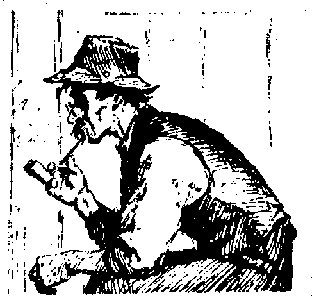
It took forever for spring to arrive in Western North Carolina.
Day after day all the cars in the area—not to mention the trucks—had ice-covered windshields every morning; it wasn’t until 10:30 or even 11:00 before the ice began to melt, and the sun warmed the car’s interior, so that getting in to start the engine had a modicum of civility to it.
Once inside, all the folks who drove up to the General Store began any salutation with general complaints about the winter just past and the distinct possibility that spring might never arrive, and even the early wildflowers would refuse to appear and just stay bound in the frozen earth and await a hot day in July for their entrance into the world.
Like many mornings before, when Cityfella walked into the store the first sound he heard was the 60-cycle hum of the florescent lights that hung on short wires from the newly painted tin ceiling. In addition there was the morning report from the AM station out of Asheville that gave a limited review of the weather because such reports actually came from an underground bunker not far from Omaha, Nebraska, entirely programmed and operated by a company that sent out such reports throughout the country, accompanied by descriptions of the area involved, so that if it was sunny outside of the General Store, the radio reported clouds and potential rain.
“Is anybody here?” asked Cityfella. “Yoo, hoo! Anybody?”
“I’m here,” answered Mr. Storekeep, “I was just down in the basement looking for that stack of new tourist maps just in case we get any business from passers-by who are in the area for the Moog Festival.”
At the moment Curmudgeon came into the store and having heard Storekeep mention Moog, hastened to correct the pronunciation of the man’s name who invented the process that changed music from being live folks in concert to imaginary folks made of electrons and digital harmonics.
“The name,” he said, “is pronounced Moog as in the average cow cry ending with a ‘g’.”
“Funny,” said Cityfella, “I always thought it was pronounced Mog, with a long ‘o’, but I could be wrong.”
“You are,” said Curmudgeon, “it is Moog.”
With that the door opened and the new air that rushed in was warming up and it looked like it might be a better than average day and soon Breadman was punching up stacks of family-sized loaves and replacing stale hot dog rolls with a new batch. “Funny,” he said, “I always thought the name was pronounced Mo-og that is a ‘mo’ followed by an ‘og’.”
“Nice day,” said Storekeep.
“Could be worse,” said Breadman.
“How about Mog as the correct pronunciation?” asked Storekeep.
“I don’t think it makes a whit of difference,” continued Breadman, “and I do remember that back in 1970, Moog received some kind of a special Grammy Award for lifetime achievements in the world of music and in 2002, he was honored with Honorary Doctorate from Berkley.”
“Then,” said Cityfella, “we are going with Mog as the pronunciation?”
“We could ask the NC Guv,” said Breadman.
“I think,” said Curmudgeon, “we should let well enough alone with the music side of the day, and instead start planning on that balloon we were going to build for our flight to Raleigh. Up in the clouds as we sail to Government House and make our demands for the governmental turnaround of things in the Tar Heel State.”
“Tar Heel State?” asked Cityfella.
“Yep,” answered Curmudgeon. “That special moniker is traced back to the state’s early history, and was suggested by the production of tar, pitch, and turpentine, all manufactured from the great pine forests of North Carolina. The production of such materials became so important that the members of the English Parliament were so impressed by the output that eventually we became a great source for the English navy. I’ve heard tell that thousands of barrels of pitch and tar were annually shipped to London for their navy’s use.”
“So we go from Moog to Tar Heel in five minutes of the meeting of some of the greatest minds in WNC?”
“Well,” said Storekeep, “it kept you all in a good frame of mind while we waited for winter to leave and spring to arrive.”
“I forgot what I came in for,” said Cityfella.
